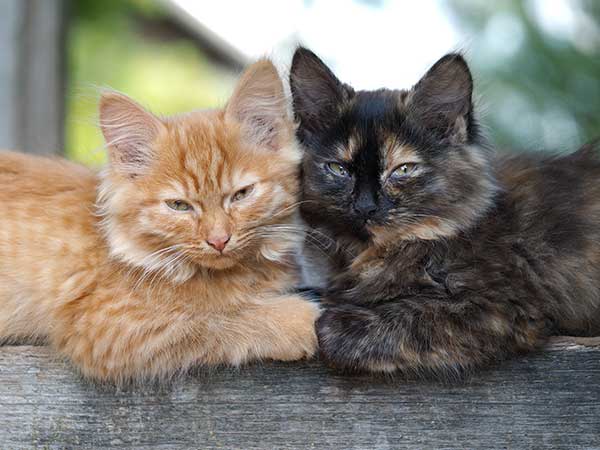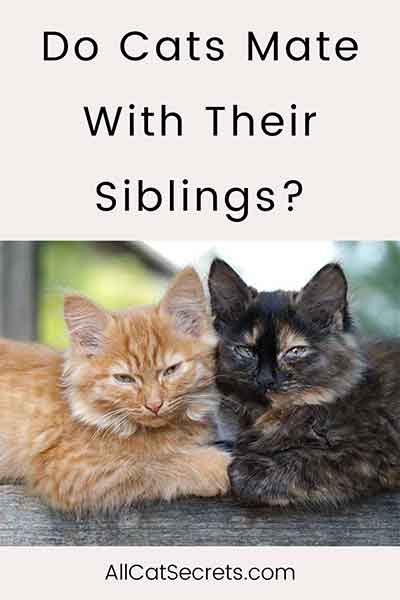Inbreeding and incest are terms that are almost taboo when used in reference to humans.
Incest refers to the sexual relationship between people considered as being too closely related to have any romantic affairs. These include siblings, parents and their children, grandparents and their grandchildren, uncles/aunts and their nephews/nieces, and cousins.
Some cases of incest may end up in the parties marrying each other and bearing children. The production of offspring from individuals who are closely related genetically is what constitutes inbreeding.
In most societies, inbreeding and incest are the archetype of moral degradation. Many countries actually consider these behaviors as criminal offenses and have gone ahead to enact punitive laws to prevent them from happening. That notwithstanding, reports of incest and inbreeding are forever on the rise.
But while most people consider incest and inbreeding as markers of sexual deviancy, many animals don’t mind engaging in these practices. And that brings us back to our question, can cats mate with their siblings?
The answer is a resounding yes. Cats will freely mate with their siblings, also known as litter mates, once they attain the age of sexual maturity.
Like all animals, a cat will go looking for a sexual partner when he enters his reproductive stage. In a cat’s world, any sexually receptive cat qualifies as a potential reproductive partner. That includes his litter mates.
But as you shall find, there are reasons to be worried if your genetically-related feline friends develop a love affair amongst each other.
In this post, we unpack everything there is to know about cats mating with their siblings. Some of the aspects the article shall address include why inbreeding happens among cats, any benefits, and what you can do to prevent this behavior.
Table of Contents
Why Do Sibling Cats Choose To Mate Together?
Like all mammals, mating comes naturally to cats. It’s part of their basic instincts. As soon as a female cat goes into heat (technically known as entering the estrus cycle), a male cat will follow his instincts to mate with the female and pass on his genes.
The body chemistry of a female cat will signal her on when the right time to mate and bear offspring is. Similarly, the body chemistry of a male cat will tell him when nearby female cats are sexually receptive.
While hormonal changes play a major role in influencing mating behaviors in cats, most of these responses are purely instinctive.
But here’s where it gets a bit gross – a sexually receptive female cat will care less about whom she mates with. That includes whether her potential male partner is her sibling or not.
However, although inbreeding comes naturally to most cats, the following factors might help fuel the phenomenon;
1. A Lack of Sense of Incest
Most animals have no sense of incest. As such, they’re not bound by the taboos and stereotypes surrounding inbreeding.
In a cat’s eyes, any sexually receptive feline is fair game. And that explains why sibling cats choose to mate together when they reach their sexually reproductive stages.
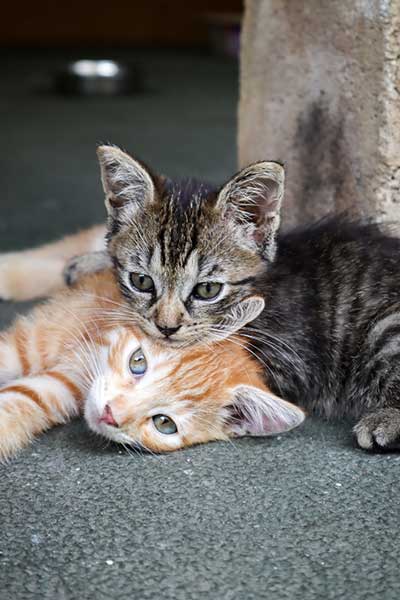
2. A Lack of Deep Familial Ties
The main reason most humans don’t commit incest is that we consider it morally wrong. Another reason is that human siblings share deep family bonds and a profound sense of respect for each other’s personal space.
Human siblings may occasionally develop sexual attractions towards each other. But the deep familial connections between the siblings would still prevent them from overtly displaying their affections. It’s all about not wanting to hurt the other person’s feelings.
Unfortunately, this isn’t the case with cats.
Cats undeniably spend a lot of their formative years with their siblings. The animals also develop strong bonds in the process. But these are not familial bonds. A cat doesn’t view his brother or sister as family. Instead, he simply considers them playmates. And there’s absolutely nothing wrong with breeding with a playmate.
Maybe you’ve always wondered, do cats know they’re siblings?
Cats don’t know they’re siblings. Cats born in the same litter consider each other playmates rather than brothers and sisters.
Is Inbreeding More Common In Some Sibling Cats Than Others?
Researchers have established that sibling inbreeding is more common in feral cats than domesticated ones. This has a lot to do with the fact that feral cats feel isolated. Therefore, they develop an even stronger instinct to breed with their siblings and other close relatives as a way of keeping the colony going. These cats understand that in the wild, there’s always safety in number.
Another thing worth noting is that inbreeding among cats doesn’t always occur naturally. Certain studies have found that female cats generally avoid copulation with close kin but not necessarily with their distant relatives.
Is It Normal For Cats To Mate With Their Siblings?
As we’ve already indicated, it’s perfectly normal for sibling cats to mate with each other. The main reason behind this reproductive behavior is that cats have no incest taboos or close familial connections. Besides, mating comes naturally to them. That’s unlike humans who may plan on when and where to breed.
So, while you may become perplexed if you discovered that your female kitto is pregnant with her sibling brother, it’s important to understand that this behavior is perfectly normal.
However, the fact that cats can mate with their siblings doesn’t necessarily mean they should.
That begs the question, is it bad for sibling cats to mate?
Although inbreeding is normal in cats, the behavior is generally discouraged. As a cat owner, it’s important to familiarize yourself with what could happen if your cat became pregnant with her sibling. We shall review all the possible dangers of inbreeding later on.
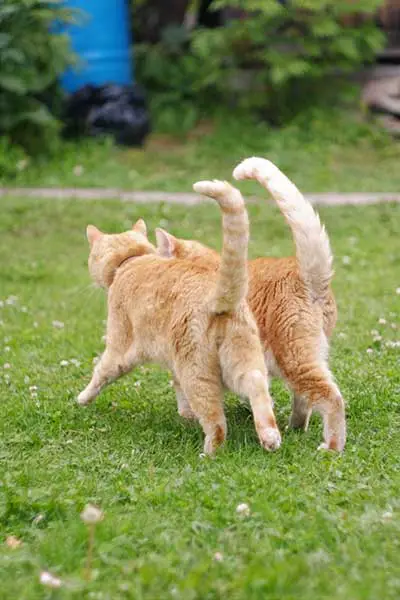
What Do Sibling Cats Need To Mate?
A cat mainly requires two things to mate with his/her sibling – a sexually receptive partner and a conducive environment.
1. A Receptive Partner
A cat will first become sexually active when he/she enters puberty. This typically happens at the age of six months. However, it can vary slightly depending on the time of year.
Your cat will likely be sexually receptive when she turns six months. But this won’t be the only time the animal becomes sexually active.
A cat’s estrous cycle will continue throughout the animal’s adult life. Note that cats do not undergo menopause. Therefore, a cat that has not been spayed will maintain her fertility and produce kittens throughout her life.
It’s also worth noting that a female cat’s estrous cycle occurs at variable intervals, with many cats going on heat every 14 to 21 days. Once the cat becomes pregnant, she’ll take roughly two months to deliver her litter. Each litter brings forth one to eight kittens.
Due to their relatively short gestation period and the number of kittens per litter, a cat can have scores of offspring in a single year. This further implies that if there’s anything wrong with sibling inbreeding (and there are), then the consequences of uncontrolled breeding may be too grim to contemplate.
2. A Conducive Environment
Sibling cats will not just up and mate provided that they feel sexually attracted to each other. The environment must also permit it.
For instance, sibling cats will likely mate when they generally get along with each other. If, say, one sibling strayed from the home and returned several weeks later, the returning cat may be considered a stranger. In such cases, the strange cat may be denied mating rights.
Environmental enrichment is another aspect constituting a conducive environment. For instance, are the cats well-fed? Do they have enough toys? And do they generally feel comfortable in their living space?
Although mating among sibling cats (and cats in general) is not a pleasurable experience due to the barbed shape of a male cat’s penis, an unfavorable environment can exacerbate the situation.
- ????????????[High Quality Materials]: Dimension: 28.74"L * 12.99"W * 36.6"H. Your cats can overlook the world on a 36.6" high...
- ????????????[Enough Rest Areas]: Cats have three resting areas, top resting basket, condos interior and luxury deep hammoock. This...
- ????????????[Protect your's furniture]: Multi-level meet your feline’s climbing nature. The cat tree has a scratching ramp at...
Last update on 2024-07-24 / Affiliate links / Images from Amazon Product Advertising API
Is Incest and Inbreeding Restricted To Litter Mates?
By now, it must be abundantly clear that brother and sister cats freely mate with each other. But is this strictly a sibling cats’ behavior or will parent cats breed with their offspring too?
All cats have no sense of taboo. Therefore, they’re all subject to incest and inbreeding.
Perhaps you’ve always wondered, will a cat mate with its offspring?
A cat will surely mate with its offspring. It doesn’t matter whether the cat is male (tom) or female (queen). Once the animal’s sexual activity peaks, he/she will not pay keen attention to whom they mate with.
Will A Male Cat Mate With His Daughter?
Now that we’ve highlighted that inbreeding comes naturally to most cats, you might now be wondering if a father and daughter cat can engage in copulation. But will a father cat mate with his daughter?
He sure will. Like any other cat, father cats have no sense of incest or family. At least not in the same way as humans. So, a father cat won’t mind mating with his daughter.
Can father and daughter cats breed?
Absolutely. Indeed, there are thousands of cats around the world born as a result of a father cat breeding with his daughters. That pretty much settles the question, ‘do father cats mate with their offspring?’
Can Mother And Son Cats Mate?
We’ve just examined that father cats can freely copulate with their daughters. But what about mother cats, will a mother cat mate with her kittens? And if she will, can a mother cat get pregnant by her son?
Not only can a mother cat mate with her son. She can also get pregnant by him.
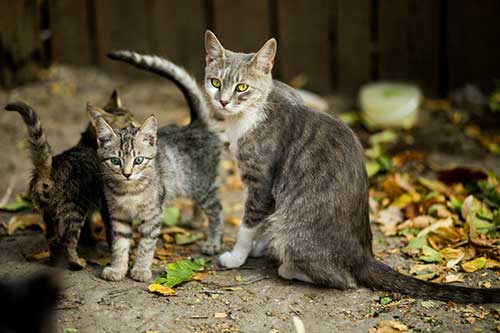
This begs another question, do my cats know they are mother and son?
Unlike humans who recognize and remember each other by vision, mother cats remember their young by scent. While nursing her litter, a mother cat will constantly exchange scents with her offspring. She then uses that scent to remember her sons and daughters.
However, this doesn’t necessarily mean that a mother cat won’t mate with her sons. The scents exchanged only make a queen recognize her offspring from other cats. It doesn’t prevent her from breeding with them.
So, can a cat get pregnant with her son?
The fact that a mother cat can freely mate with her sons makes it 100% possible to become pregnant with her sons.
Do mother cats mate with their offspring?
The term “offspring” here simply implies a mother cat’s sons. And as we’ve seen, a mother cat won’t care less about engaging in copulation with her sons.
So, Will Cats Mate With Their Family?
Cats will mate with their family. That includes siblings, parents, and children.
Even grandparent cats can mate with their grandchildren. And the same holds true for uncle/aunt cats and their nieces/nephews.
What Are The Benefits Of Mating Sibling Cats?
Cat breeders are known to mate kittens back to parents. Mating closely related cats is an ingenious way of developing certain desired traits. These attributes could either be physical or behavioral/personality-based.
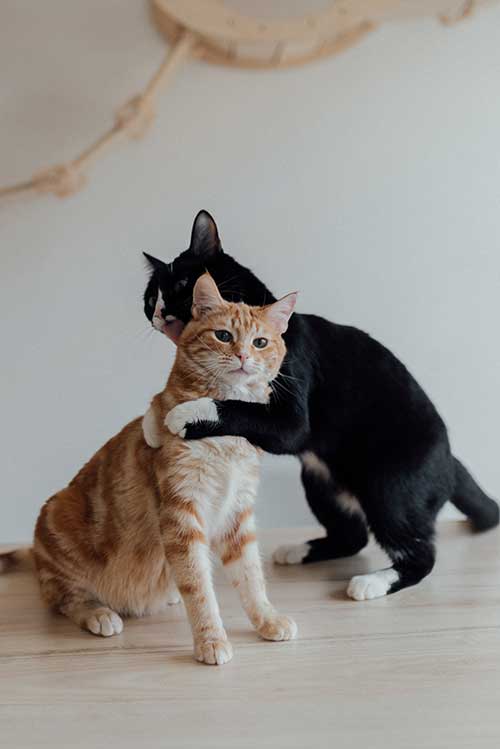
Below are notable desired physical features that might cause you to mate your sibling cats;
- Leg size, usually longer legs
- Ear size and shape
- Tail size
- Skull or muzzle shape and size
- Fur volume, where a cat owner may desire more or less fur in the offspring
- Overall cat size relative to other cats of the same breed
Some positive personality attributes that could cause you to mate your sibling cats include;
- Mellowness or calm temperament
- Reduced vocalization
- Playful demeanor
- Ease of socialization
- Intelligence and trainability
- Reduced incidences of chronic diseases
- Longer lifespan
Mating litter mates or other closely related cats allows you to predict the behaviors and personality of the offspring. Although the offspring may not be identical to its parents, physically or personality-wise, the kittens will always have more of their parents’ dominant traits.
- CONTAINS: This pack of Delectables Bisque contains thirty (30) 1.4-ounce lickable cat treats.
- CATS LICKS THE BOWL CLEAN: These bisque cat treats combine tender chicken or succulent fish with a smooth and satisfying sauce for...
- TASTY TEXTURE FOR CAT TREATS: The meat and sauce are entangled in this tasty wet texture, ensuring your kitty eats the whole cat...
Last update on 2024-07-24 / Affiliate links / Images from Amazon Product Advertising API
What Happens When Sibling Cats Mate?
The obvious thing that will happen when sibling cats mate is that they’ll likely produce kittens. It’s not unusual to find a cat owner wondering, can brother and sister cats have kittens?
Not only can cats born in the same litter mate. They can also bring forth offspring. And this applies to other cats too. A father cat can mate with and impregnate her daughters. A mother cat can equally breed with and become pregnant by her sons. Grandfather and grandchildren will suffer the same fate. As will uncles/aunts and their nieces/nephews.
But the more pertinent questions to answer here are – what happens if a cat gets pregnant by her brother and what happens if a male cat mates with his mother. Will the offspring be healthy? Will they die prematurely? Do such offspring have relatively shorter lifespan and higher susceptibility to disease?
Let’s find out by highlighting some of the dangers associated with mating closely related cats;
1. Genetic Defects
Various studies have shown that about 65% of Persian cats have at least one genetic disorder. Researchers attribute these findings partly to the fact that Persian cats are the most widely inbred.
Inbreeding increases susceptibility to congenital defects. While the risks of genetic defects tend to be more common in pedigree cats, any inbred cat is vulnerable.
Congenital disorders occur in inbred offspring due to certain genetic abnormalities in their parents. These abnormalities are passed down when the parents mate. The fact that inbreeding occurs within a limited gene pool implies that uncontrolled inbreeding further increases the chances of passing defective genes from parents to their offspring.
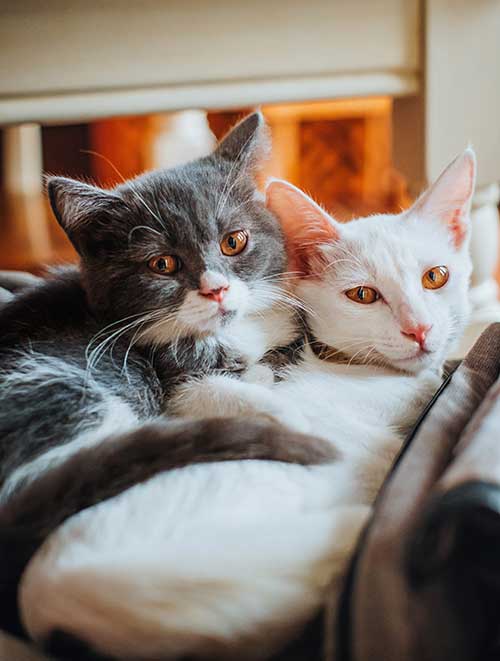
The following are some genetic effects of overbreeding genetically related cats;
- Smaller or diminutive adult cat sizes
- Congenital abnormalities, such as flat faces, wonky eyes, crooked nose, misaligned jaw, teeth defects, mouth defects, smaller limbs, etc.
- Reduced fertility
- Reduced birth rate
- Immune deficiencies, leading to increased susceptibility to cancer, joint problems, and other chronic conditions
In addition to the above defects, inbred offspring may also have a relatively lower life span. That begs the question, how long do inbred cats live?
The average life expectancy of a cat is between 15 and 17 years. However, inbred cats may live even shorter. That’s due to their higher susceptibility to diseases that could impair their growth and development.
Perhaps you’ve once wondered, ‘my mom cat got pregnant by her son, are the kittens gonna be messed up?
Unfortunately, cats born to closely related parents may develop a wide range of congenital defects.
However, it’s worth noting that the chances of inbred offspring suffering congenital defects depends on the genetic composition of their individual parents. Genes can be classified into Dominant or Recessive, depending on how they get expressed on an animal’s DNA.
Dominant genes always pass on the dominant behaviors from parents to their offspring, whereas recessive genes pass the less dominant traits. As with all mammals, a cat gets half of his DNA from his father and half from his mother.
Dominant genes will be expressed where there’s a Dominant/Recessive pair, while recessive genes will be expressed where there’s a Recessive/Recessive pair. In other words, offspring cats born to genetically related parents will only exhibit undesirable traits if both parents contributed a recessive gene.
That said, inbreeding is still discouraged. At least for average cat owners with limited education and training on reproductive health.
- High protein cat food dry formula with real chicken as the first ingredient
- Natural with prebiotic fiber nourishes specific intestinal bacteria for digestive health
- Wholesome cat food dry kibble with vitamin A and Omega-6 fatty acids to nourish skin and coat
Last update on 2024-07-24 / Affiliate links / Images from Amazon Product Advertising API
2. Increased Mortality Rate
We’ve already mentioned that offspring cats born to closely related parents will have reduced immunity and a lower lifespan.
However, mortality rates among inbred cats aren’t only determined by the offspring’s higher susceptibility to disease. It partly results from the fact that a cat may become pregnant unusually earlier in her growth cycle.
Remember that cats attain sexual maturity at six months. If a female cat comes from a household comprising other male cats, there’s a 100% likelihood that she may become pregnant at six months. That’s because there will always be cats around to meet her sexual needs. Like all mammals, cats could die of birth-related complications if giving birth while too young.
If inbreeding weren’t normal in cats, it would take a couple more months for a female cat to find a suitable mate. The longer duration would lower mortality rates as it ensures the cat is mature enough before conceiving.
How to Prevent Sibling Mating In Cats?
One frequently raised concern pertaining to inbreeding in cats is, ‘my cat may be pregnant by her son. Help!’
There’s little you can do if your cat is already pregnant by her brother, father, son, or other closer family member. You can only prevent this phenomenon from recurring.
The best way to go about that is by neutering or spaying your sibling cats. And the ideal time to neuter or spay cats is right before they reach puberty – 5 months.
Note that neutering or spraying is a painstaking task that will almost always require the intervention of your vet. So, be sure to contact your vet when your kittens approach their sexually reproductive age.
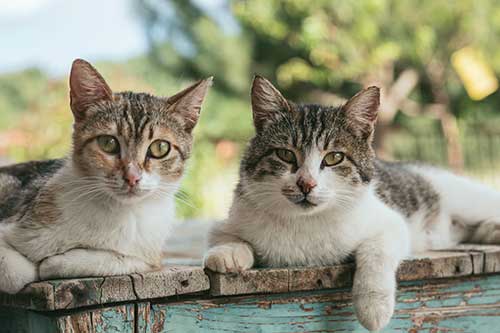
Do Cats Mate With Their Offspring?
Cats do mate with their offspring. Although incest is held with a degree of spite among humans, this sexual behavior is perfectly normal for cats and most other mammals. Besides, inbreeding may offer some benefits.
However, the cons of inbreeding far outweigh the pros. So, it’s best to prevent genetically related cats from mating with each other by having the animals neutered or spayed.
Additionally, due to the similarity in appearance, in order for both you and the cat to be fully recognizable as individuals in their respective relationships, each cat can be given an exclusive tag to wear, such as a customized keychain that serves as a cat tag.
Keychains Co. can be customized to any pattern and material, and you can add your own creativity here entirely. Cat tags help you get to know your pet and also serve as a testament to your relationship.

Checkout Our Favorite Cat Products
1. Best Online Course For Cat Parents
Our favorite: The Cat Language Bible (How to Finally Understand And Speak to Your Cat) – A new form of cat to human communication that many cat owners have dreamed about… but few have actually thought possible.
2. Best Immune Support For Cats
Our favorite: Tomlyn Immune Support – Best Supplement for Cats and Kittens.
3. Best Cat Treats
Our favorites: LIFE ESSENTIALS All Natural Freeze Dried Chicken And Sheba Meaty Tender Sticks – Both are Great.

